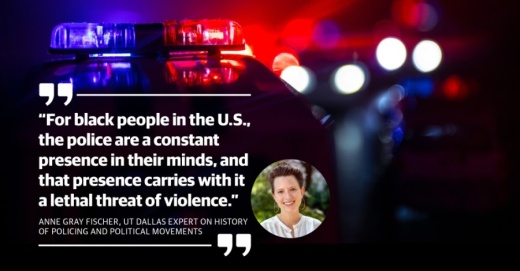An expert at The University of Texas at Dallas said years of racial injustice paired with the tense moment in today’s society may explain why Floyd’s death became the proverbial straw that broke the camel’s back.
Protests against police brutality are not new and can be traced back to Emancipation in the 1860s, said Anne Gray Fischer, an assistant professor of history who specializes in policing and political movements. In the 1960s, there were hundreds of uprisings in response to police violence, she added.
“The struggles we are seeing today are bound up with the longer history of the black freedom struggle since the Civil War,” she said.
There was a brief period following the Civil War when police forces were made up of freed slaves charged with targeting white terrorists, such as the Ku Klux Klan. By the late 1800s, local law enforcement generally became protectors of wealthy white people and their property, she said.
“Protecting some comes at the expense of others, and that zero-sum logic has consistently proven itself to be white protection at the expense of black lives,” she said.
Over the course of decades, black Americans have witnessed police officers not only turn a blind eye to violence but also sometimes participate in it, Fischer said. This has created an environment where many black Americans do not see police as protectors but rather as terrorizers, she said.
“For black people in the U.S., the police are a constant presence in their minds, and that presence carries with it a lethal threat of violence,” she said.
Part of why police brutality has continued is because reform proposals, such as better training and more inclusive hiring, have had little impact on the level of police authority, Fischer said.
“The calls we’ve seen in the last 50 or 60 years don’t materially change police autonomy, discretion or power,” she said.
Compounding the issue of excessive power is the militarization of police forces, Fischer said. Increased federal and state funding over the years has been allocated toward the purchase of military equipment, such as tanks, riot gear and military-grade weapons, she said.
“[This happened] alongside legal rulings that empowered police to act with full discretion and to shield themselves from accountability,” she said.
Better training depends on internal police oversight, but society has witnessed the repeated failure of police to enforce their own code of conduct, Fischer said. This has contributed to the erosion of trust between citizens and officers, she said.
“In the Twin Cities, it was only after public protests that the police involved with George Floyd’s murder were then charged,” she said. “It was actually quite surprising that they were fired in the first place.”
A big part of the solution would be more public oversight, Fischer said. Floyd’s death was caught on video, but there are many instances of police violence that are hidden from public view, she said.
“[Public oversight] is something that police departments have historically resisted because they want full autonomy to practice their methods in the way they see appropriate or that they see fit,” she said.”
Priorities have shifted with this latest incident, Fischer said. Instead of fighting for oversight, people are now questioning whether funding for police would be better spent on education, health care and basic social services.
“Money that could be going to invest in communities is being drained away and lavished on police departments,” she said.
For Fischer, the outrage that followed Floyd’s death would likely not have reached the level it did if not for the coronavirus pandemic.
Black people are more at risk for contracting the virus and are also dying at a much faster rate than those who are not black, she said. These disparities are rooted in political and social inequality, such as inferior access to health care, she added.
“All of these public health issues that disproportionately impact black communities are being revealed in the pandemic,” she said.
Protesters are motivated by a tremendous sense of urgency to solve a problem that goes back at least 150 years, Fischer said.
“We’ve been experiencing generations and generations of violence and the devaluing of black lives, and I think people are extremely frustrated,” she said. “Yet, at the same time, they’re hopeful that by going on the streets and making their voices heard, that that will affect some meaningful change.”
From a historian’s perspective, protests are useful because they serve as an enduring source of inspiration for future generations, Fischer said. The public’s view on whether violence is an effective form of protest is also beginning to shift, she said.
“People seem to be coming around to the idea that black lives are more valuable than property,” she said. “Property can be replaced, can be insured, can be rebuilt. George Floyd’s life cannot.”
Fischer said she hopes Floyd’s death will enact meaningful change and will give way to a shift in policy. But an end to police brutality cannot happen without police giving up some of their power, she said.
“If police can show an active commitment to de-militarizing themselves, de-escalating violence, to standing down and relinquishing their total authority ... I do think that would be an important first step,” she said.





